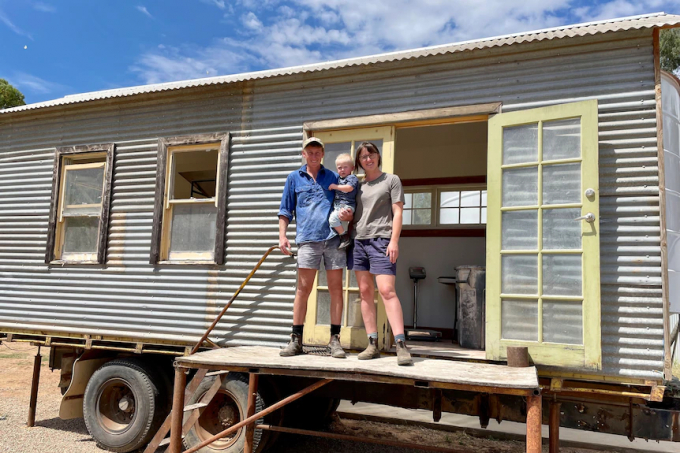June 8, 2025 | 08:35 GMT +7
June 8, 2025 | 08:35 GMT +7
Hotline: 0913.378.918
June 8, 2025 | 08:35 GMT +7
Hotline: 0913.378.918

Courtney and Ian are currently milling about 300kgs of flour per day. Photo: ABC Rural: Annie Brown
When Ian and his wife Courtney Young finished studying at university, they wanted to get involved in the family farm, so they started looking for ways to value add.
"We met at uni studying the same course," Ms Young said.
"There weren't many people value-adding grain grown on large-scale farms.
"We could have gone into value-adding the lambs that Ian's parents were farming but it was complicated and too many producers were already doing that."
The couple established Woodstock Flour, named after the family farm in 2016.
They started stone milling wheat, rye and spelt grown on the Congdon family’s farm at Melbourne farmers markets with a small kitchen mill.
Six years later, they are now milling 300 kilograms per day to keep up with commercial demands.
They will soon have a second stone mill and will be able to double the capacity.
The metro market
With Melbourne bakers ordering tonnes of flour per week, the couple decided to invest in a commercial stone mill imported from the United States and set up in Berrigan.
"It's still a small amount of flour we're producing compared to the big mills but it's enough to keep us busy with two young kids," Ms Young said.
The flour is sold at a premium price with the starting price at $7.60 for a 1kg bag.
"Most of our flour goes into Melbourne and slowly, Sydney," Ms Young said.
"It is in a higher-range market, but people are willing to pay for the flavour and the nutritional benefits.
"Regional and rural areas have been much slower but is it happening.
Next generation getting into farming
Courtney and Ian recently moved onto their own property just outside Rutherglen, Victoria with plans to continue farming into the future.
"We've finally bought our own place. It's only 100 acres but it's a really nice starting point for us," Ms Young said.
"We wouldn't have got here if we didn't have this value-adding business."
Courtney says the flour-milling business allowed them to purchase land and with strong markets in place, they can grow their farm.
"Farming for a commodity market is so volatile, especially for young people who are dealing with massive land prices.
"We can have this small block in Lilliput because we're confident in our market and if we have a crappy year then we still have a business that can support itself irrespective of bad weather.
"It's so important that we are moving beyond the year-to-year farming and trying to get the highest yields.
"The more of us engaging in regenerative farm practices the better, I think."
Flour power
Growing up on the farm in Berrigan, Ian says they always ate their own lamb and occasionally his mother would make bread from the wheat with a kitchen mill.
"It was called a whisper mill, but it never whispered, it roared," Mr Congdon said.
Ms Young says it is rewarding to see the grain from the paddock be turned into food like bread.
"Ian actually milled his best mate's first-ever wheat crop from his new farm," Ms Young said.
"We made it into a loaf of bread for him, and so we all ate his wheat.
"We're super passionate about building a local grain economy, which is where grain is celebrated for its regionality and diversity.
(ABCNews)

(VAN) With the war ongoing, many Ukrainian farmers and rural farming families face limited access to their land due to mines and lack the financial resources to purchase needed agricultural inputs.

(VAN) Vikas Rambal has quietly built a $5 billion business empire in manufacturing, property and solar, and catapulted onto the Rich List.

(VAN) Available cropland now at less than five percent, according to latest geospatial assessment from FAO and UNOSAT.

(VAN) Alt Carbon has raised $12 million in a seed round as it plans to scale its carbon dioxide removal work in the South Asian nation.

(VAN) Attempts to bring down the price of the Japanese staple have had little effect amid a cost-of-living crisis.

(VAN) Fourth most important food crop in peril as Latin America and Caribbean suffer from slow-onset climate disaster.

(VAN) Shifting market dynamics and the noise around new legislation has propelled Trouw Nutrition’s research around early life nutrition in poultry. Today, it continues to be a key area of research.